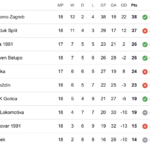ZAGREB, November 13, 2018 – Leaders of Croatian public sector unions said on Monday they had rejected the government’s offer of a base pay increase of three percent for 2019, adding that they would continue their struggle for a fair price of labour through various forms of pressure, including strikes.
Nine public sector unions have turned down the government’s offer after their leaderships discussed the proposal, the leader of the Independent Union of Secondary School Teachers, Branimir Mihalinec, told a press conference. He added that the unions welcomed the government’s plan to increase tax-free bonuses to 7,500 kuna (1,000 kuna).
Asked about the possibility of a strike, Mihalinec said they were still discussing this option and would decide on its timing. He noted that 86 percent of the membership had indicated they were in favour of striking.
The head of the Matica association of trade unions, Vilim Ribić, said that the government’s offer was unacceptable because public-sector wages had been lagging behind those in the manufacturing sector for 10 years because of a recession and a wrong economic policy.
Unions have recently warned that the gap between public-sector and real-sector wages now stands at 18.9% compared to the pre-crisis period ten years ago.
Finance Minister Zdravko Marić said on Monday that a 3% increase of the base pay in 2019 is the government’s last offer to public sector unions. Speaking in the commercial TV broadcaster RTL’s news programme on Monday evening, Marić said that the government did not intend to back down.
“We have made that very clear because the 3% increase isn’t that small in relation to the total wage budget, and it amounts to about 900 million kuna annually. On the other hand, naturally we would all want the increase to be higher and will work on creating conditions for that in the time to come,” Marić said.
He said that the government had very clearly, openly and transparently communicated the base pay increase, similarly to the situation last year when an agreement was reached with some unions on an increase of 6% in the base wage.
“This increase, too, reflects the current fiscal and budget possibilities. That was our proposal, we didn’t approach the matter with any hidden agendas, and were very open and transparent. Our plan is to continue talks on an annual basis and try and see what the budget possibilities are,” he added.
He said that the government had never treated public and state services as less important than other sectors. “We are all aware of the importance of nurses, doctors, teachers, police officers, customs officers, cultural workers and welfare workers,” he said.
For more on Croatia’s budget, click here.







